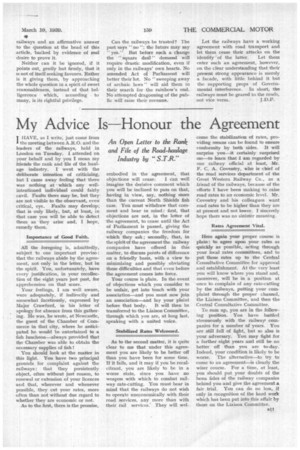My Advice Is Honour the Agreement
Page 45

If you've noticed an error in this article please click here to report it so we can fix it.
An Open Letter to the Rank and File of the Road-haulage Industry by " S.T.R."
I HAVE, as I *rite just come from 1 the meeting between A.R.O. and the leaders of the railways, held in London on Tuesday. I attended on your behalf and by you I mean my friends the rank and file of the haulage industry. I went with the deliberate intention of .
but I came away feeling that there was nothing at which any wellintentioned individual could fairly cavil. Faults there may be, but they are not visible to the observant, even critical, eye. Faults may develop; that is only likely, but, at least, in that case you will be able to detect them. as they arise and, I hope, remedy them.
Importance of Good Faith.
All the foregoing is, admittedly, subject to one important proviso; that the railways abide by the agreement, not only in the letter, but in the spirit. You, unfortunately, have every justification, in your recollection of the eight years just past, for apprehension on that score.
Your feelings., I am well aware, were adequately, if indirectly and somewhat facetiously, expressed by Major Crawfurd, in his letter of apology for absence from this gather ing. He was, he wrote, at Newcastle, the guest of the Chamber of Commerce in that city, where he anticipated he would be entertained to a fish luncheon—always provided that the Chamber was able to obtain the necessary supplies of fish.!
You should look at the matter in this light. You have two principal grounds for complaint against the railways; that they persistently object, often without just reason, to renewal or extension of your licences and that, wherever and whenever possible, they cut your rates, more often than not without due regard to whether they are economic or not.
As to the first, there is the promise,
embodied in thefl agreement, that
objections will cease. I can well imagine 'the derisive comment which you will be inclined to pass on that, having in view, say, nothing more than the current North Shields fish case. You must withdraw that comment and bear in mind: first, that objections are not, in the letter of the agreement, to cease until the Act of Parliament is passed, giving the railway companies the freedom for which they ask; secondly, that, in the spirit of the agreement the railway companies have offered in this matter, to discuss points of difference on a friendly basis, with a view to minimizing and possibly obviating these difficulties and that even before the agreement comes into force.
Your course is plain. In the event of objections which you consider to be unfair, get into touch with your association--and you must now join an association—and lay your plaint before that body. It will then be transferred to the Liaison Committee, through which you are, at long last, speaking with a united voice.
Stabilized Rates Welcomed.
As to the second matter, it is quite clear to me that under this agreement you are likely to be better off than you have been for some time. If it fails, and it may if you be recalcitrant, you are likely to be in a worse state, since you have no weapon with which to combat railway rate-cutting. You must bear in mind that the railways do not wish to operate uneconomically with their road services, any more than with their rail services. They will wel• come the stabilization of rates, providing means can be found to ensure conformity by both sides. It will surprise you—it certainly surprised me—to learn that am regarded by one railway official at least, Mr. F. C. A. Coventry, who is chief of the road services department of the Great Western Railway Co., as a friend of the railways, because of the efforts I have been making to raise road rates to an economic level. Mr. Coventry and his colleagues want road rates to be higher than they are at present and not lower. I sincerely hope there was no sinister meaning.
Rates Agreement Vital.
Here again your proper course is plain: to agree upon your rates as quickly as possible, acting through your local rates committees, and to put those rates up to the Central Consultative Committee for approval and establishment. At the very least you will know where you stand and, moreover, will be in a position at once to complain of any rate-cutting by the 'railways, putting your complaint through the proper channel, the Liaison Committee, and then the Central Consultative Committee.
To sum up, you are in the following position. You have battled strenuously with the railway' companies for a number of years. You are still full of fight, but so also is your adversary. You may fight for a further eight years and still be no better off than you are to-day. Indeed, your condition is likely to be worse. The alternative—to try to come to an agreement—is clearly, the wiser course. For a time, at least, you should put your doubts of the bona fides of -the railway companies behind you and give the agreement .a fair trial. You can do no less, if only in recognition of the hard work which has been put into this affair by those on the Liaison Committee.




























































































